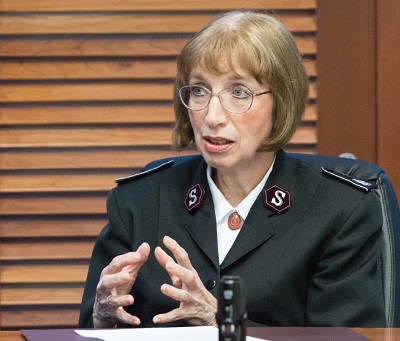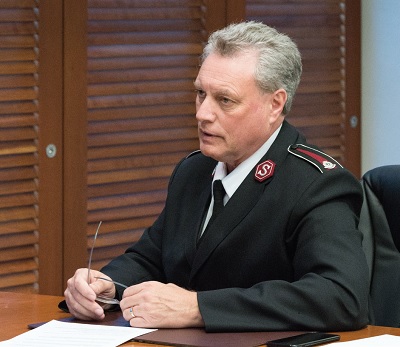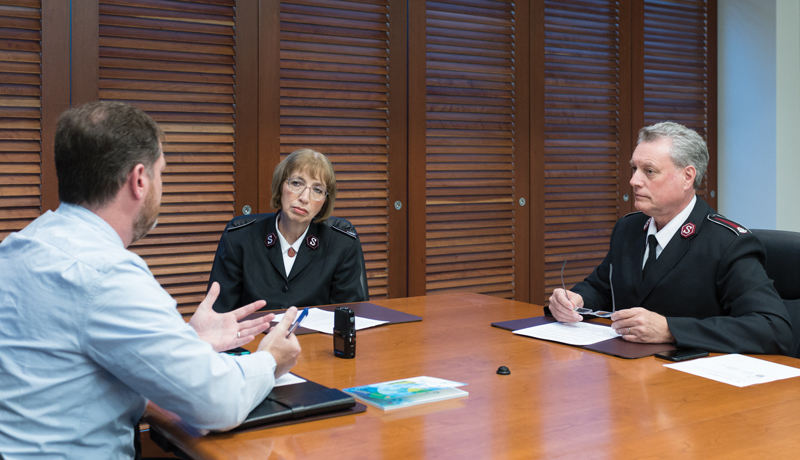In what ways do we need to be accountable?
Colonel Lee Graves: We need to be accountable first to God through his Word. In 2 Timothy 3:16-17, we learn that Scripture is inspired by God; it teaches us what is true and helps correct what is wrong in our lives. Our mission is the gospel of transformation and the biblical text holds us accountable.
We also need to be accountable to each other. I believe accountability in this territory begins at the top, between the territorial commander and the chief secretary. We need to model it at the highest level. My hope is that it reverberates through the ranks so that leadership at every level is an example of accountability.
Lastly, it is important for us to uphold the laws of the land. Scripture calls us to pray for those in authority and render unto Caesar what is Caesar’s. Sometimes legislation is imposed that adds an aspect of complexity to our work, but we must nevertheless be compliant with government regulations.
Commissioner Susan McMillan: In terms of our stakeholders, the more that we involve Salvationists, our advisory boards and external volunteers in decisions that are made, the more we can be accountable to them. We don’t want to make decisions for people without hearing from them. We’re consulting now more than ever before. And we, in turn, have high expectations for Salvationists, employees and volunteers—accountability is a two-way street.
How is The Salvation Army governed differently than other churches?
SM: Many churches are governed by an elected board or synod, which makes decisions for the local denomination. Our Governing Council is appointed by the Office of the General. As an international organization, we can collaborate across borders in ways that other denominations and other non-profits cannot. In Canada, we are constituted by an Act of Parliament, a law, which means our constitution is strong and can’t be changed on a whim.
LG: Our governance embraces both the ecclesiastical and the temporal aspects of our organization. We build bridges from social work into corps and from corps back into the community. Our governance allows us to maintain this integrated approach, and that makes us unique. While some donors may struggle to understand the connection between our religious and social work, we know that faith is the engine that drives our ministry.
How are we becoming more open and transparent?
SM: In fiscal matters, we are required to produce consolidated financial reports. Our accounting system now allows us to demonstrate to the public in our annual report everything that is happening in The Salvation Army across Canada. That’s a significant step.
 “Without God we’re not going to be effective, no matter how hard we try.” —Commissioner Susan McMillan
“Without God we’re not going to be effective, no matter how hard we try.” —Commissioner Susan McMillan
LG: At the congregational level, we need annual general meetings to hold leadership and corps boards accountable for the receipt and expenditure of resources. That needs to be an inclusive and consultative conversation.
Where have we created forums to ask difficult questions?
SM: Three years ago we established a local officers’ forum, with representative corps sergeant-majors from every division. The chief and I meet with them regularly by teleconference to hear their concerns and questions. We published an article in Salvationist magazine (salvationist.ca/articles/leading-the-way) to encourage people to connect with their divisional representatives. Our Ethics Centre has also been conducting a study program on human sexuality, which is an opportunity for Salvationists to ask those questions.
LG: The Journey of Renewal booklet speaks about the shifting culture. Organizationally, we need to create the spaces for difficult questions. But we also need leaders who are welcoming and open to that kind of dialogue. It begins at the training college where we encourage our cadets not just to say, “Yes sir, no sir,” but to reason together. Something is terribly broken if our officers, employees and soldiers feel they cannot ask the hard questions, be respected and receive a fair response. Culturally, we need to get to a place where it becomes more natural, comfortable and expected that we would dialogue together. I think we are making progress in this area.
Only 68 per cent of corps in the territory are self-supporting and many don’t have the reserve funds to sustain them through emergencies. How will the Army address this challenge?
SM: We need transparency at the corps level. Corps treasurers can help congregations understand corps financial statements, sources of income and what their responsibilities might be. At divisional headquarters, we aim to support corps that may be in highly effective mission situations but have few resources. At the territorial level, we’re also reviewing our territorial funding model to see if it needs adjustment.
LG: We’ve created eight guiding principles that can be considered when developing a strategy to improve the sustainability of a corps. Some corps may be in deficit but are highly effective. How do we measure the impact? What are the outcomes? Is transformation taking place? If so, that’s where we need to put our resources.
Where there is ineffectiveness, pruning may be necessary. Before leaving a community, let’s try to reinvent ourselves and re-engage with different models. But to continue to do the same thing we have always done, just because we always have, is not serving the kingdom well.
Some Army personnel feel stressed out by the administrative workload. How do we relieve the pressure?
LG: We need to acknowledge that the administrative workload can be overwhelming. We have a complexity workgroup that is looking at our organization, from our systems to our structure, in an effort to try to determine how we can become more effective and efficient. We want to free people so that they can advance the mission as much as possible.
SM: We need the organization of staff support and office work so that front-line ministry can happen. That administrative work in itself is not a bad thing, but it’s getting the proper balance so that we don’t overburden people. It’s important that we get the numbers right so that we can compare our statistics over time, to understand where we’ve been and where we’re going. Without accurate data, we can’t make informed decisions. We rely on individuals in the field to be accurate in their reporting.
What specific steps is The Salvation Army in Canada and Bermuda taking to track progress and learn from our experience?
SM: Program services compiles statistics for corps and puts them together in ways that help us understand the trends. On the social services side, statistics are kept for government reporting, and that’s necessary as well. But beyond the numbers, we need to get a handle on how we are making a difference in people’s lives and changing communities.
LG: Part of it is getting to that transformational storytelling piece. We are working with our National Advisory Board to help us to understand impact measurement, not only to define it better but to develop tools that we can use across the territory.
SM: We recently piloted the Halo Project, which measures the positive economic impact that a Salvation Army ministry unit can have on a community. In the case of Montreal Citadel, for example, the economic benefit to the community was $4.76 for every dollar we invest. While that’s extremely helpful, it’s still just an economic measure; it doesn’t explain how the community was improved or individual lives were transformed. We need those who are in the field to help us to understand how we can measure the impact of what we’re doing.
Are we sometimes tempted to dodge our responsibility, using excuses such as “That’s not my job,” “I’m too busy” or “I was just following orders”?
SM: I don’t think excuse-making is a universal thing. It’s something that you hear from time to time, but we have wonderful personnel who take their responsibility tremendously seriously. I was chatting recently with social services staff who do a midnight soup run for people on the streets. They don’t submit time sheets, they consider it volunteer work. “We love it, and we want to serve,” they told me. These are employees who’ve grasped the significance of what they do, who are willing to add volunteer time to what they’re already doing. We must keep empowering people to do their job, and help them understand how valued they are. Then they’re going to take pride in it.
 “We need to create the spaces for difficult questions … where it becomes natural and expected.” —Colonel Lee Graves
“We need to create the spaces for difficult questions … where it becomes natural and expected.” —Colonel Lee Graves
The Royal Commission in Australia recently investigated instances of abuse in Salvation Army institutions in that country. What safeguards do we have in place for children?
SM: The Salvation Army acknowledges and deeply regrets the harm suffered by children under its care in Australia and is working with the government on a national redress scheme for survivors. It’s no coincidence that care for children is now one of the pillars of our accountability movement. In our territory, we have rigorous screening and training of staff, church members and volunteers who will work with children. We’ve been centralizing our database to be sure that we’re not placing anyone at risk.
LG: We have a territorial abuse advisor, Nancy Turley, who is helping us ensure we have policies and procedures to keep people safe. We also have a whistleblower policy, with a confidential phone number for reporting abuses. Upon the report of abuse, an investigation is launched with step-by-step procedures for dealing with offences.
Is there a danger that excessive planning and risk management may cause us to be too “safe” and miss places where God is calling us to step out in radical faith?
LG: Yes, we have to guard against overreaction. Finding the balance is critical. We don’t want to stymie a person’s passion, nor do we want to create mission paralysis. But we do have to be careful at the same time. If we could all be good students of orders and regulations and operating policies, then we would be a stronger organization. We also need to use common sense: look before you leap and don’t work in isolation.
SM: We don’t want people to be so afraid to make a mistake that they don’t try something new. On the other hand, I’ve been in some dangerous places in my life, and my experience has been to trust people on the ground. For example, the Army was working in a difficult neighbourhood outside of Buenos Aires in Argentina. The captain there was an amazing woman who could walk through that dangerous neighbourhood and be entirely safe because everyone knew her. But when she saw trouble brewing and told us we needed to leave, we left. You have to trust that our expert ministry workers know what they’re doing.
It’s easy to get discouraged or blame others when things don’t go well. How do we counter a culture of cynicism and negativity?
SM: As leaders we need to be encouragers and recognize the wonderful work people are doing. I think the cynics are fewer and farther between than they once were, and I sense a general enthusiasm as I travel the territory.
LG: It’s the servant leadership principle. We need humble, honest leaders who can create a culture that’s conversational. We’re not helped when everybody agrees just because they feel they have to agree. We’re made better sometimes when we don’t agree; healthy disagreement can lead to growth. The Bible uses the metaphor of iron sharpening iron (see Proverbs 27:17).
SM: It’s better to speak up to your leader to identify a problem and work out a solution than to walk around with a negative attitude. To just grumble about it doesn’t help you or the organization; it brings everyone down, including yourself.
How do we keep accountable on our spiritual journey?
LG: Spiritual health is one of our territorial priorities. Whether you’re an officer, soldier or employee, we’re encouraging resources for personal faith development. This includes spiritual directors, spiritual retreats, RightNow Media (a streaming web service with Christian programming) and resources for spiritual disciplines (saspirituallife.ca).
SM: Someone in a devotional talk recently used the example of the airplane and the oxygen masks. When there is an emergency and the oxygen masks come down, the flight attendant tells you to put your own mask on first before you help your neighbour in distress. If you don’t, you’ll both pass out. It starts with taking care of our own spiritual health and ministry flows from there. Without God we’re not going to be effective, no matter how hard we try.
The Journey of Renewal booklet outlines the Accountability Movement and contains practical tips and tools to integrate accountability into your work, mission and ministry. It is available in English and French and can be downloaded at accountability.salvationarmy.org. Watch future issues of Salvationist magazine for articles on each of the accountability pillars.
Photos: Timothy Cheng










Comment
On Tuesday, March 12, 2019, Carolyn said:
On Monday, January 22, 2018, Concerned said:
On Saturday, January 20, 2018, Stephen Hooper said:
On Saturday, January 20, 2018, Gerry said:
Leave a Comment